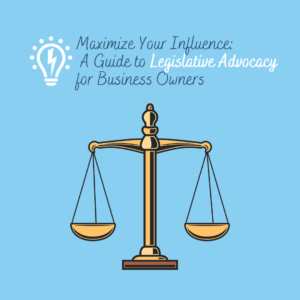
Influence Maximization, Laws begin as ideas from the people. The level of government that considers these laws usually depends on where these ideas gain traction. While much attention is focused on federal legislative changes, small business owners across various sectors often face legislative challenges at the state or local level. As a business owner, it’s important to engage proactively in these legislative processes. In this article, we’ll explore three key steps you can take to effectively communicate with lawmakers and represent your business interests.
1. Engage with Lawmakers at All Levels / Influence Maximization
Start by creating a list of lawmakers at every level, from local city councils to Congress. A good place to begin is USA.gov where you can find all of the elected officials who represent you. Once you’ve identified them, be sure to sign up for their newsletters and attend their events, such as town halls and meetings, whether in person or online.
It’s not necessary to travel to Washington to meet with Federal Lawmakers — every Member of Congress also has one or more offices in their congressional district. Influence Maximization, Even if the Member is not in the local office(s), there is a permanent staff member at each office with whom you can meet.
2. Monitor Legislative Developments
Sign up for free services like LegiScan to keep track of laws at your state and federal level. Staying informed is crucial for understanding how potential changes might impact your business.
3. Introduce Yourself to Lawmakers
Lawmakers positions require them to make decisions about countless issues, so they may not be familiar with the specific challenges your industry faces. Take the initiative to introduce yourself. A short, preferably handwritten, note can make a significant impact. Be direct, keep it to one page, and offer yourself as a resource on issues impacting your industry.
Email Communication
Email is an efficient way to reach out to legislators or their staff. Keep your message brief and include essential details like your name, address, and other contact information. Attachments should be minimal and relevant.
Writing a Formal Letter
There are times when a formal letter is more appropriate, especially when responding to a specific call to action from a business association. Ensure your letter reaches the correct lawmaker and avoid asking for actions beyond their power. A well-crafted formal letter should:
- Introduce yourself and your connection to the district.
- State the purpose of your contact, referencing specific bills if relevant.
- Present facts to support your position.
- Discuss the impact on your business and the community.
- Request a response with your contact information.
- Close with your contact details and any relevant professional affiliations.
The Power of Public Relations in Legislative Advocacy
Imagine being a lawmaker, responsible for making decisions on a wide range of topics, from consumer protections to zoning laws. It’s impossible for legislators to be experts in every field they encounter. So, how do they make informed decisions? Often, they turn to the internet for quick research, and what they find predominantly are news stories. This reality underscores the critical importance of public relations in your legislative advocacy efforts.
Engaging with local media to share your story isn’t just about good publicity for your business; it’s a strategic move in shaping the information landscape that lawmakers might encounter when researching topics relevant to your industry. By actively working with the media, you can ensure that the narrative around your business and industry is accurate, informative, and accessible.
Here are some steps to leverage PR in your advocacy efforts:
- Develop Relationships with Local Media: Establish connections with local journalists and news outlets. Be a resource they can turn to for insights into your industry.
- Craft Your Story: Clearly articulate the unique aspects of your business and how proposed legislation could impact not just your operations but also the community at large.
- Be Proactive in Sharing News: Don’t wait for journalists to find you. Proactively share news stories, industry developments, and your expert opinions on relevant legislative matters.
- Utilize Multiple Channels: Apart from traditional media, use digital platforms and social media to amplify your voice. A well-rounded PR strategy ensures broader reach and impact.
- Educate and Inform: Use your interactions with the media as opportunities to educate the public and legislators about your industry. This can foster a more informed decision-making process in legislative matters.
Incorporating PR into your legislative advocacy strategy enhances your visibility and influence, ensuring that when lawmakers search for information, they find compelling narratives that support your business’s interests and the broader community.
Shaping the Future: Influence Maximization
Influence Maximization, Your engagement in legislative advocacy is not just a responsibility but a powerful tool in shaping the future of your business and industry. Whether it’s through direct communication with lawmakers, proactive public relations, or leveraging your unique insights, your voice plays a crucial role. Remember, each step you take in advocacy not only helps safeguard your business but also contributes to a more informed, fair, and business-friendly legislative environment. Embrace this role with confidence, knowing that your efforts make a real difference in the intricate tapestry of small business success.
Interested in partnering with our award-winning PR Firm to help your legislative efforts? Get in touch today!
Also Checkout: 6 Steps for Turning Podcasts into Effective Outreach
